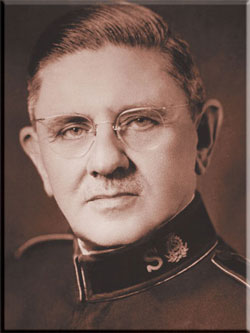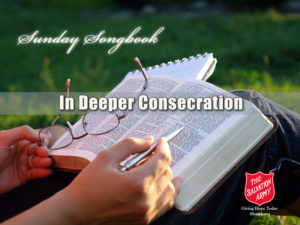The Saviour of men came to seek and to save the souls who were lost to the good;
His Spirit was moved for the world which He loved with the boundless compassion of God.
And still there are fields where the labourers are few, and still there are souls without bread,
And still eyes that weep where the darkness is deep, and still straying sheep to be led.
Except I am moved with compassion,
How dwelleth Thy Spirit in me?
In word and in deed burning love is my need;
I know I can find this in Thee.
Oh, is not the Christ ‘midst the crowd of today, whose questioning cries do not cease?
And will He not show to the hearts that would know the things that belong to their peace?
But how shall they hear if the preacher forbear or lack in compassionate zeal?
Or how shall hearts move with the Master’s own love without His anointing and seal?
It is not with might to establish the right, nor yet with the wise to give rest;
The mind cannot show what the heart longs to know, nor comfort a people distressed.
O Saviour of men, touch my spirit again, and grant that Thy servant may be
Intense every day as I labour and pray, both instant and constant for Thee.
Words: Albert Orsborn Music: Traditional Tune – The Old Rustic Bridge
S.A. Song Book #527 Section:The Life of Holiness – Consecration and Service
Reference: The Website of the Salvation Army – Australia South
 Albert Orsborn, the Salvation Army’s “Poet General”, was born in England in 1886 and lived until 1967. The word “poet” refers to his writing of many lovely hymns, as well as his book, The House of My Pilgrimage. He was commissioned as an officer in 1905, and served in pastoral, training and administrative work in England and New Zealand. He understood human vulnerability, as his first wife, and later his second, died at a young age. In 1946 he was elected as the sixth general of the worldwide Salvation Army, and in 1947 he married Commissioner Mrs. Phillis Taylor, a daughter of General Higgins.
Albert Orsborn, the Salvation Army’s “Poet General”, was born in England in 1886 and lived until 1967. The word “poet” refers to his writing of many lovely hymns, as well as his book, The House of My Pilgrimage. He was commissioned as an officer in 1905, and served in pastoral, training and administrative work in England and New Zealand. He understood human vulnerability, as his first wife, and later his second, died at a young age. In 1946 he was elected as the sixth general of the worldwide Salvation Army, and in 1947 he married Commissioner Mrs. Phillis Taylor, a daughter of General Higgins.
General Orsborn’s priorities were to continue the Army’s evangelical emphasis and to renew its worldwide fellowship, which had been torn by World War 2. He inaugurated the Advisory Council to the General, initiated the first Brengle Institute (for teaching holiness) and approved the Army’s participation as a founding member of the World Council of Churches. Clearly General Orsborn combined his spiritual, poetic sensitivity with practical administrative ability and vision.
O Saviour of men, touch my spirit again Share on X




